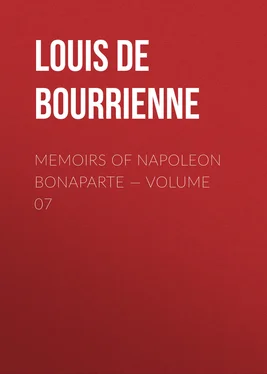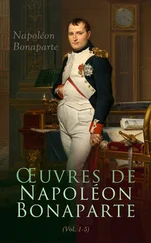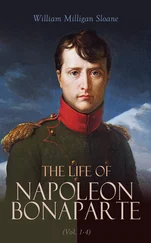As Fouche, however, persisted in his assertion, the First Consul sent to Paris for the Grand Judge, Regnier, who showed Fouche the letter he had received. The First Consul triumphed at first to see Fouche at fault; but the latter so clearly proved that Georges and Pichegru were actually in Paris that Regnier began to fear he had been misled by his agents, whom his rival paid better than he did. The First Consul, convinced that his old minister knew more than his new one, dismissed Regnier, and remained a long time in consultation with Fouche, who on that occasion said nothing about his reinstatement for fear of exciting suspicion. He only requested that the management of the business might be entrusted to Real, with orders to obey whatever instructions he might receive from him. I will return hereafter to the arrest of Moreau and the other persons accused, and will now subjoin the account of a long interview which I had with Bonaparte in the midst of these important events.
On the 8th of March 1804, some time after the arrest but before the trial of General Moreau, I had an audience of the First Consul, which was unsought on my part. Bonaparte, after putting several unimportant questions to me as to what I was doing, what I expected he should do for me, and assuring me that he would bear me in mind, gave a sudden turn to the conversation, and said, "By the by, the report of my connection with Hortense is still kept up: the most abominable rumours have been spread as to her first child. I thought at the time that these reports had only been admitted by the public in consequence of the great desire that I should not be childless. Since you and I separated have you heard them repeated?"—"Yes, General, oftentimes; and I confess I could not have believed that this calumny would have existed so long."—"It is truly frightful to think of! You know the truth—you have seen all—heard all —nothing could have passed without your knowledge; you were in her full confidence during the time of her attachment to Duroc. I therefore expect, if you should ever write anything about me, that you will clear me from this infamous imputation. I would not have it accompany my name to posterity. I trust in you. You have never given credit to the horrid accusation?"—"No, General, never." Napoleon then entered into a number of details on the previous life of Hortense; on the way in which she conducted herself, and on the turn which her marriage had taken. "It has not turned out," he said, "as I wished: the union has not been a happy one. I am sorry for it, not only because both are dear to me, but because the circumstance countenances the infamous reports that are current among the idle as to my intimacy with her." He concluded the conversation with these words:—"Bourrienne, I sometimes think of recalling you; but as there is no good pretext for so doing, the world would say that I have need of you, and I wish it to be known that I stand in need of nobody." He again said a few words about Hortense. I answered that it would fully coincide with my conviction of the truth to do what he desired, and that I would do it; but that suppressing the false reports did not depend on me.
Hortense, in fact, while she was Mademoiselle BEAUHARNAIS, regarded Napoleon with respectful awe. She trembled when she spoke to him, and never dared to ask him a favour. When she had anything to solicit she applied to me; and if I experienced any difficulty in obtaining for her what she sought, I mentioned her as the person for whom I pleaded. "The little simpleton!" Napoleon would say, "why does she not ask me herself: is the girl afraid of me?" Napoleon never cherished for her any feeling but paternal tenderness. He loved her after his marriage with her mother as he would have loved his own child. During three years I was a witness to all their most private actions, and I declare that I never saw or heard anything that could furnish the least ground for suspicion, or that afforded the slightest trace of the existence of a culpable intimacy. This calumny must be classed among those with which malice delights to blacken the characters of men more brilliant than their fellows, and which are so readily adopted by the light-minded and unreflecting. I freely declare that did I entertain the smallest doubt with regard to this odious charge, of the existence of which I was well aware before Napoleon spoke to me on the subject, I would candidly avow it. He is no more: and let his memory be accompanied only by that, be it good or bad, which really belongs to it. Let not this reproach be one of those charged against him by the impartial historian. I must say, in concluding this delicate subject, that the principles of Napoleon on points of this kind were rigid in the utmost degree, and that a connection of the nature of that charged against him was neither in accordance with his morals nor his tastes.
Конец ознакомительного фрагмента.
Текст предоставлен ООО «ЛитРес».
Прочитайте эту книгу целиком, купив полную легальную версию на ЛитРес.
Безопасно оплатить книгу можно банковской картой Visa, MasterCard, Maestro, со счета мобильного телефона, с платежного терминала, в салоне МТС или Связной, через PayPal, WebMoney, Яндекс.Деньги, QIWI Кошелек, бонусными картами или другим удобным Вам способом.












